#Polyhouse solutions
Text
Polyhouse farming development services
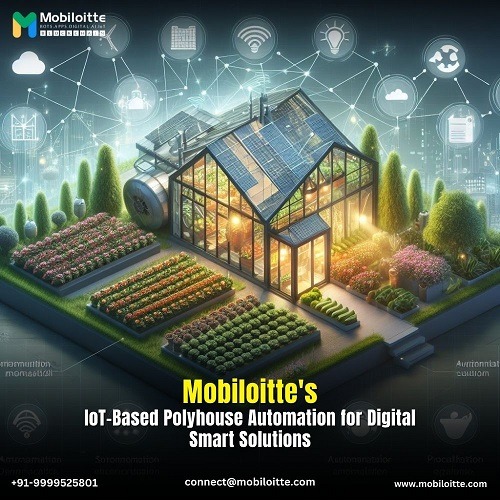
Ready to revolutionize your farming game? Explore the future with Mobiloitte’s cutting-edge Polyhouse farming development services! We offer complete solutions to make your farming more productive and effiicieint. Our services include Design and Construction, Irrigation and Water Management, Climate Control, Crop Management, Technology Integration, Market Linkages, Financial and Funding Services, Soil Management, Seed and Plant Sourcing, Waste Management, Greenhouse Automation, Insurance and Risk Management, Supply Chain Optimization, Post-Harvest Technologies etc. Are you ready to take your farming business to the next level? Contact us today!!
#Polyhouse solutions#Smart Solutions#IoT Based Digital#Polyhouse farming development services#Polyhouse Automation IoT Based Digital Smart Solutions
0 notes
Text
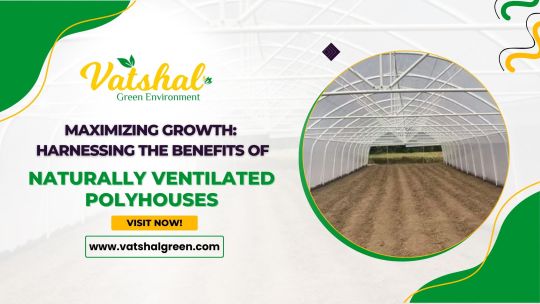
Maximizing Growth: Harnessing the Benefits of Naturally Ventilated Polyhouses
Discover the transformative potential of Naturally Ventilated Polyhouses in maximizing crop yields while minimizing environmental impact. Explore innovative solutions for sustainable agriculture.
Contact us at +91 78743 79887, +91 75677 79887, or
visit: https://bit.ly/4dCyP8n
#EcoAgriInnovation#NaturallyVentilatedPolyhouses#PolyhousePerfection#SustainableYields#GreenhouseRevolution#EcoFriendlyFarming#VentilatedVeggies#MaximizeGrowth#AgriTechSolutions#ClimateSmartAgri#GreenhouseAdvantage#OrganicFarming#Agribusiness#vatshalgreen
0 notes
Text
Revolutionizing Agriculture: IGO Agritech Farms’ Best Polyhouse Project in Chennai
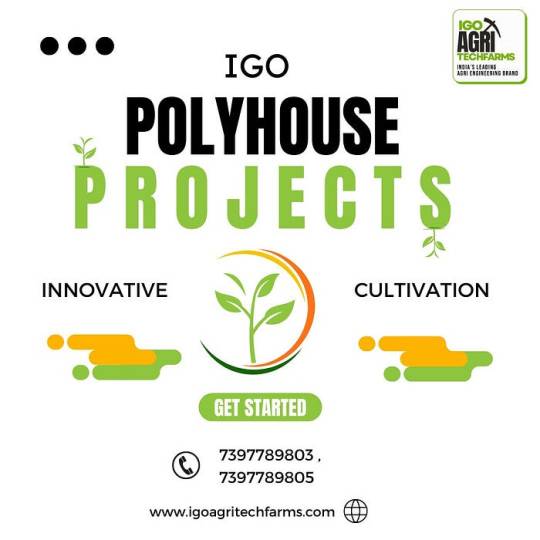
Introduction: In the realm of modern agriculture, innovation is key to sustainable and efficient farming practices. Polyhouses, also known as greenhouse farming, have emerged as a groundbreaking solution, particularly in regions with challenging climatic conditions like Chennai, India. Among the pioneers in this agricultural revolution stands IGO Agritech Farms, spearheading polyhouse projects that redefine farming possibilities. Let’s delve into how IGO’s polyhouse services are transforming the landscape of agriculture in India.
Understanding Polyhouse Farming: Polyhouse farming involves the cultivation of crops within a controlled environment, typically constructed using polyethylene material. These structures enable farmers to regulate temperature, humidity, and other environmental factors, ensuring optimal conditions for plant growth throughout the year. In regions like Chennai, characterized by extreme temperatures and erratic rainfall, polyhouses offer a reliable means to overcome environmental constraints and maximize agricultural productivity.
IGO Agritech Farms: Leading the Way in Polyhouse Projects With a commitment to innovation and sustainability, IGO Agritech Farms has emerged as a frontrunner in polyhouse projects in Chennai and across India. Leveraging state-of-the-art technology and expertise, IGO offers comprehensive polyhouse services tailored to the unique needs of farmers.
Key Features of IGO’s Polyhouse Projects:
Advanced Infrastructure: IGO’s polyhouses are equipped with cutting-edge infrastructure, including climate control systems, irrigation mechanisms, and monitoring tools. These features ensure precise regulation of environmental parameters, fostering optimal conditions for plant growth.
Crop Diversity: From high-value horticultural crops to cash crops and medicinal plants, IGO’s polyhouse projects support a diverse range of agricultural produce. By customizing polyhouse designs to suit specific crop requirements, IGO enables farmers to cultivate a variety of plants with high market demand.
Yield Optimization: By mitigating the impact of adverse weather conditions and pest infestations, IGO’s polyhouses optimize crop yields year-round. This not only enhances farm profitability but also promotes food security and economic resilience within local communities.
Sustainability Initiatives: Committed to environmental stewardship, IGO integrates sustainable practices into its polyhouse projects. From water conservation measures to renewable energy integration, IGO prioritizes eco-friendly solutions that minimize environmental impact and promote long-term sustainability.
The Impact of IGO’s Polyhouse Projects: IGO Agritech Farms’ polyhouse projects have catalyzed a paradigm shift in Chennai’s agricultural landscape. IGO has unlocked new opportunities for agricultural growth and prosperity by empowering farmers with innovative technology and expertise. Increased crop yields, enhanced profitability, and resilience to climate variability are just some of the benefits experienced by farmers who have adopted IGO’s polyhouse solutions.
Conclusion: In the journey towards sustainable agriculture, polyhouse farming emerges as a beacon of hope, offering a pathway to overcome the challenges of climate change and resource scarcity. Through its pioneering polyhouse projects, IGO Agritech Farms is not only transforming agriculture in Chennai but also inspiring a nation-wide movement towards agricultural innovation and resilience. As we look towards the future, IGO’s commitment to excellence continues to fuel optimism for a brighter, more sustainable agricultural ecosystem in India.
To Know More Contact Us:
Ph: +91 7397789803, 05
Mail: [email protected]
Website: www.igoagritechfarms.com
#igoagritechfarms#agriculture#Best polyhouse farming#what is polyhouse farming#polyhouse farming cost#hydroponics#best polyhouse farming company in india#open cultivation#what are the crops use for polyhouse
0 notes
Text
Polyhouse Subsidy: A Game Changer for Small-Scale Farmers
In the realm of agriculture, small-scale farmers often face significant challenges ranging from unpredictable weather patterns to market volatility. However, one revolutionary solution has emerged to empower these farmers and transform their livelihoods – polyhouse farming. This innovative method, coupled with government subsidies, has become a game-changer for small-scale farmers, offering them a sustainable path towards prosperity.
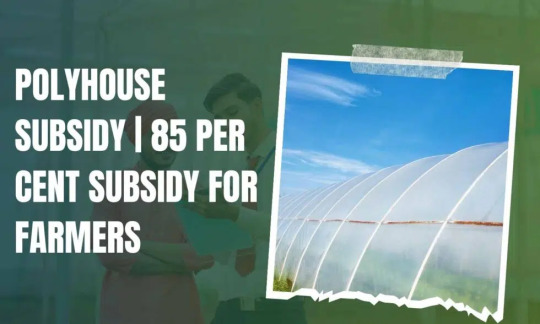
Understanding Polyhouse Farming
Polyhouse farming, also known as greenhouse farming, involves cultivating crops within a controlled environment. Unlike traditional open-field farming, polyhouses provide farmers with the ability to regulate temperature, humidity, and light intensity, creating an ideal microclimate for crop growth. This technology not only extends the growing season but also protects crops from adverse weather conditions and pests.
The Benefits of Polyhouse Farming for Small-Scale Farmers
For small-scale farmers, polyhouse farming offers a myriad of benefits:
Increased Yield: By creating optimal growing conditions, polyhouses enable farmers to achieve higher yields compared to traditional methods. This increase in productivity directly translates to higher incomes for small-scale farmers.
Crop Diversification: Polyhouse farming allows farmers to grow a wide range of crops throughout the year, regardless of seasonal limitations. This diversity not only reduces the risk associated with monoculture but also opens up opportunities for niche markets and premium pricing.
Resource Efficiency: Polyhouses are designed to maximize resource utilization, requiring less water and fertilizer compared to open-field farming. Moreover, the controlled environment minimizes the need for pesticides and herbicides, promoting sustainable agricultural practices.
Quality Assurance: The controlled environment of polyhouses ensures consistent quality and uniformity in crops, meeting the stringent standards of modern markets. This quality assurance enhances the marketability of produce, leading to better returns for farmers.
Government Subsidies: Empowering Small-Scale Farmers
Recognizing the potential of polyhouse farming to revolutionize agriculture, governments around the world have introduced various subsidies and incentives to support small-scale farmers in adopting this technology. These subsidies typically cover the cost of infrastructure, equipment, and training associated with setting up polyhouses, making it more accessible to farmers with limited financial resources.
In addition to financial support, governments also provide technical assistance and advisory services to help farmers optimize their polyhouse operations. This includes guidance on crop selection, pest management, and best practices for maintaining the polyhouse environment. By leveraging these resources, small-scale farmers can overcome the initial barriers to adoption and harness the full potential of polyhouse farming.
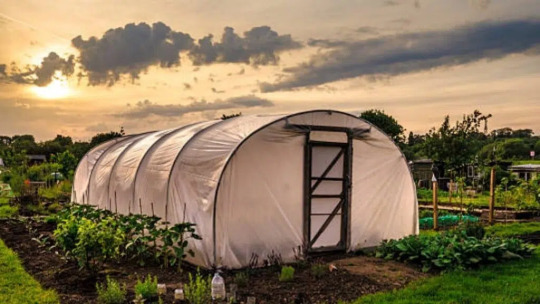
One exemplary success story in the realm of polyhouse farming is Kavyaorganicfarm, a small-scale farm located in rural India. With the support of government subsidies, Kavyaorganicfarm transformed its traditional farming practices by embracing polyhouse technology. Today, the farm boasts a diverse range of high-value crops, including tomatoes, bell peppers, and strawberries, grown year-round in their state-of-the-art polyhouses.
By harnessing the power of polyhouse farming and government subsidies, Kavyaorganicfarm has not only increased its income but also improved the livelihoods of the surrounding community. Through knowledge sharing and capacity building initiatives, the farm serves as a beacon of inspiration for other small-scale farmers, illustrating the transformative potential of polyhouse farming.
Polyhouse Subsidy - A Game Changer for Small-Scale Farmers
In conclusion, polyhouse farming, coupled with government subsidies, has emerged as a game-changer for small-scale farmers worldwide. By providing a controlled environment for crop cultivation, polyhouses offer increased yield, crop diversification, resource efficiency, and quality assurance. With the support of subsidies, small-scale farmers can overcome financial barriers and embrace this transformative technology, as exemplified by Kavyaorganicfarm. As we look towards a more sustainable and resilient agricultural future, polyhouse subsidy programs hold the key to unlocking the full potential of small-scale farming.
For more information on polyhouse farming and subsidies, visit Kavyaorganicfarm today!
By incorporating the keyword "Polyhouse Subsidy" strategically throughout the blog, we aim to optimize its search engine ranking and visibility, ultimately helping small-scale farmers discover the transformative potential of polyhouse farming with subsidies.
1 note
·
View note
Text

Hi-Tech Farming: Protected Cultivation Structures!
Explore the forefront of agricultural innovation with our hi-tech farming solutions. Our protected cultivation structures - Nethouses, Polyhouses, and Greenhouses - are revolutionizing farming practices, ensuring optimal conditions for crop growth while minimizing environmental impact. Join us in embracing sustainable agriculture for a greener future!
For More Information visit:- https://bit.ly/3Tu2s3H
#HiTechFarming#ProtectedCultivation#Nethouses#Polyhouses#Greenhouses#SustainableAgriculture#InnovationInFarming#FarmingTechnology#GreenerFuture
0 notes
Text
A Growing Industry of Protected Cultivation, Insights on Share and Growth
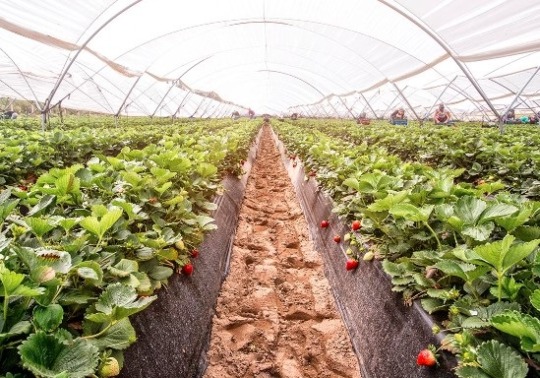
Introduction to Protected Cultivation
Protected cultivation, also known as greenhouse farming, revolutionizes traditional agricultural practices by providing controlled environments for optimal plant growth. This article delves into the burgeoning industry of protected cultivation, exploring market analysis, growth trends, and key players shaping its landscape.
Understanding the Protected Cultivation Industry
Overview of Protected Cultivation Industry
Protected cultivation refers to the practice of cultivating crops under controlled environmental conditions within structures like greenhouses or polytunnels. This method offers numerous advantages, including protection from adverse weather conditions, pests, and diseases, leading to higher yields and better quality produce.
Market Analysis of Protected Cultivation
The protected cultivation industry has witnessed significant growth in recent years, driven by increasing demand for fresh produce, rising concerns about food security, and advancements in greenhouse technologies. Market analysis reports indicate a steady expansion of the protected cultivation market globally, with a projected CAGR of 8% over the next five years.
Key Components of Protected Cultivation Market
Market Growth Trends
Protected cultivation market growth is fueled by factors such as urbanization, changing dietary preferences, and the need for sustainable agricultural practices. As consumers become more health-conscious and environmentally aware, there is a growing demand for locally grown, pesticide-free fruits and vegetables, driving the expansion of protected cultivation.
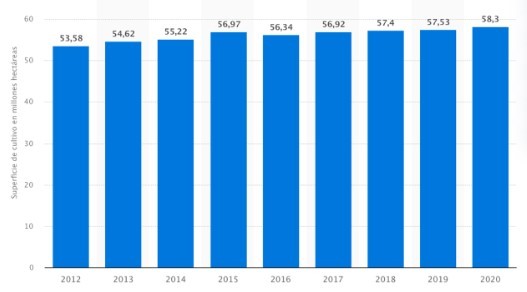
Click here – To know more about Crop Protection Market
Market Outlook and Revenue Forecast
The outlook for the protected cultivation market is optimistic, with experts forecasting continued growth in the coming years. Revenue projections indicate a steady increase, with The Global Market expected to surpass USD 50 billion by 2025, driven by investments in modern greenhouse technologies and supportive government policies promoting greenhouse farming.
Market Size and Share Dynamics
The protected cultivation market size varies across regions, with developed economies like North America and Europe leading the way. However, emerging markets in Asia-Pacific and Latin America are also experiencing rapid growth, fueled by increasing adoption of protected cultivation methods and rising demand for fresh produce.
Major Players in the Protected Cultivation Market
The protected cultivation market is characterized by the presence of several key players, including:
GreenTech Agro Corp
Polyhouse Solutions Ltd.
AgriPlast Industries
HortiMaX B.V.
Richel Group
These companies specialize in greenhouse technology, equipment manufacturing, and agricultural inputs, playing a crucial role in driving innovation and technological advancements in the industry.
Conclusion
Protected cultivation offers a sustainable solution to meet the growing demand for fresh, high-quality produce in an increasingly urbanized world. With advancements in greenhouse technologies and supportive government policies, the protected cultivation market is poised for continued growth and innovation, shaping the future of agriculture.
#Protected Cultivation Market Analysis#Protected Cultivation Market Demand#Protected Cultivation Market Forecast#Protected Cultivation Market Growth#Protected Cultivation Market Outlook#Protected Cultivation Market Revenue#Protected Cultivation Market Size#Protected Cultivation Market Trends#Protected Cultivation Market#Protected Cultivation Industry#Protected Cultivation Market Share#Protected Cultivation Industry Research Reports#Protected Cultivation Market Research Reports#Protected Cultivation Market Major Players
0 notes
Text
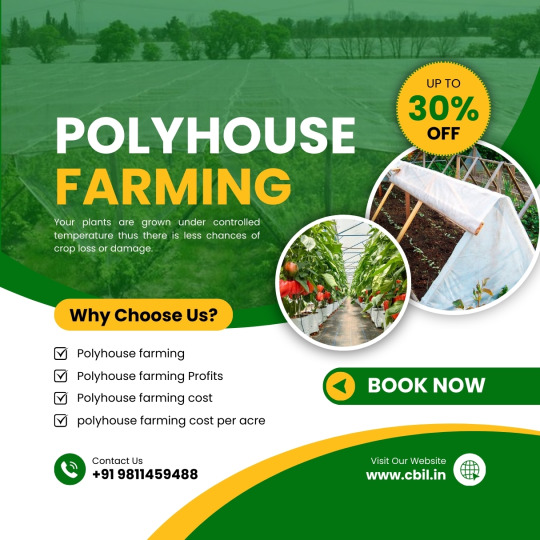
🌱 Exciting News! Introducing our latest innovation in farming technology: Polyhouse Farming Tents at an incredibly low cost! 🚀
🌿 Say goodbye to traditional farming constraints and hello to efficient, sustainable agriculture with our affordable playhouse tents. 💡
🌞 Shield your crops from harsh weather conditions while maximizing growth potential, all without breaking the bank! 🌧️
🌍 Join the revolution towards accessible, high-yield farming solutions. Get ready to cultivate success with Polyhouse Farming Tents! 🌾
𝙑𝙞𝙨𝙞𝙩 𝙃𝙚𝙧𝙚 > https://captobiotech.com/
💥💥 𝐁𝐮𝐲 𝐍𝐨𝐰 > +𝟵𝟭 𝟵𝟴𝟭𝟭𝟰𝟱𝟵𝟰𝟴𝟴
captobiotech
#polyhouse#greenhouse#polyfarming#hightechagri#polytent#techfarming#organicfarming#advanceagri#nethouse#crops#farming#FarmingInnovation#Polyhouse#SustainableAgriculture#LowCostSolution 🚜
0 notes
Text
Modern Techniques in Horticulture: A Comprehensive Guide for BSc Horticulture Students
In the dynamic field of horticulture, where innovation meets cultivation, the integration of modern techniques is transforming the landscape. This guide, presented in collaboration with the College Forum for the Best BSc Horticulture Colleges in Dehradun, serves as a compass for BSc Horticulture students navigating the exciting realm of modern horticultural techniques. Let's explore the cutting-edge practices shaping the future of crop management and cultivation.
Precision Agriculture: One of the game-changers in modern horticulture is precision agriculture. BSc Horticulture students at the Best Colleges in Dehradun delve into the use of advanced technologies, such as GPS-guided tractors and drones, to optimize resource utilization, monitor crop health, and enhance overall efficiency in the cultivation process.
Protected Cultivation: Greenhouses and polyhouses have become integral to modern horticulture. This technique provides a controlled environment, shielding crops from adverse weather conditions while allowing for customized climate and nutrient management. BSc Horticulture students gain hands-on experience in these structures to maximize yield and quality.
Hydroponics and Aquaponics: Revolutionizing traditional soil-based cultivation, hydroponics and aquaponics have gained prominence in modern horticulture. BSc students explore soilless cultivation methods, cultivating plants in nutrient-rich water solutions. This sustainable approach enhances resource efficiency and minimizes environmental impact.
Vertical Farming: With urban spaces at a premium, vertical farming emerges as a solution in modern horticulture. BSc Horticulture students learn to maximize space utilization by growing crops in vertically stacked layers, often indoors. This innovative approach ensures year-round production and minimizes the ecological footprint.
Biotechnology and Genetic Engineering: Advancements in biotechnology play a pivotal role in modern horticulture. BSc students delve into genetic engineering techniques for crop improvement, disease resistance, and the development of varieties with enhanced nutritional profiles. Understanding these methods is crucial for addressing contemporary agricultural challenges.
Integrated Pest Management (IPM): In modern horticulture, sustainable pest management is prioritized through Integrated Pest Management (IPM). BSc Horticulture students learn to combine biological, cultural, and chemical control methods to minimize the environmental impact while ensuring crop protection.
Data Analytics and Farm Management Software: The infusion of data analytics and farm management software empowers BSc Horticulture graduates to make informed decisions. This modern approach enables real-time monitoring of crop conditions, yield predictions, and resource utilization, contributing to efficient and sustainable horticultural practices.
Career Implications: For BSc Horticulture students aspiring to lead the industry, proficiency in modern techniques is paramount. Graduates from the Best BSc Horticulture Colleges in Dehradun equipped with knowledge in precision agriculture, protected cultivation, biotechnology, and sustainable practices are well-positioned for diverse and impactful careers in horticulture.
Conclusion: The landscape of horticulture is evolving, and BSc Horticulture students at the Best Colleges in Dehradun have the opportunity to be at the forefront of this transformation. By embracing and mastering modern techniques, they are not only cultivating crops but also contributing to a sustainable and innovative future for horticulture. This guide serves as a stepping stone for BSc Horticulture enthusiasts to embark on a journey of discovery and excellence in the modern world of horticulture.
0 notes
Text
About Polyhouse Films Uses & Applications in Agriculture

Polyhouse films, also known as greenhouse films or polyethylene films, are widely used in agriculture for constructing polyhouses or greenhouses. These films serve various purposes and have several applications in modern farming practices. Here are some common uses and applications of polyhouse films.
These Polyhouse sheets serve various purposes and have several applications in agriculture. Here are some common uses and applications of plastic polyhouse film:
Crop Protection - The films act as a barrier, protecting crops from harsh weather conditions such as rain, wind, and extreme temperatures. They also help in preventing the entry of pests and diseases, reducing the need for chemical pesticides.
Climate Control – This plastic films create a controlled environment within the structure, allowing farmers to manipulate temperature, humidity, and light levels.
Temperature Regulation - Polyhouse sheets can trap solar radiation, creating a warmer environment inside the structure. This is especially advantageous in cold climates or during the colder seasons, extending the growing season for crops.
Light Diffusion - Polyhouse sheets are designed to allow the transmission of sunlight while diffusing it to create an even distribution of light within the polyhouse. This helps in preventing hot spots and reduces the intensity of direct sunlight, promoting uniform growth and preventing sunburn on plants.
UV Stabilization – This polyhouse films are made with Polyethylene which are often treated to resist degradation from ultraviolet (UV) radiation. UV stabilization ensures the longevity of the films and prevents them from becoming brittle or losing their structural integrity over time.
Water Conservation - Some polyhouse sheets are designed to control the amount of water entering the structure, allowing for efficient water conservation.
Insect & Pest Control - polyhouse sheets helps in preventing the entry of insects and pests, reducing the need for chemical pesticides and promoting more sustainable farming practices.
Organic Farming - Polyhouses provide a protected environment that can be conducive to organic farming practices. They help in minimizing the impact of external factors, allowing farmers to grow organic crops with reduced reliance on synthetic inputs
Crop Quality Improvement - The controlled environment provided by polyhouse films contributes to improved crop quality, yield, and consistency. This is beneficial for growing high-value crops and meeting market demands.
Season Extension - Polyhouse sheets enable the extension of the growing season by providing a controlled environment. This is particularly beneficial for growing crops outside their natural growing seasons, thereby increasing overall productivity.
Overall, agriculture polyhouse films play a crucial role in modern agriculture by offering a versatile and efficient solution for creating controlled environments that enhance crop production and quality.
0 notes
Text
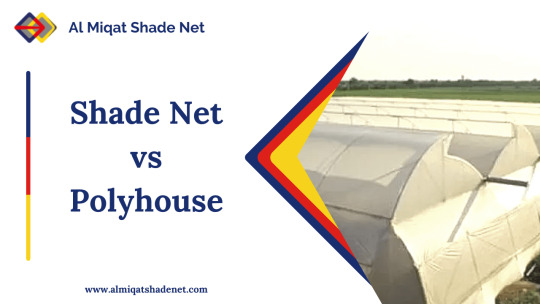
Shade Net Vs Polyhouse
Shade netting and polyhouses (polytunnels or greenhouse structures) serve different purposes in agriculture, and they have distinct features and applications. Here's a comparison between shade netting and polyhouses:
Shade Netting:
Purpose:
Shade Protection: The primary purpose of shade netting is to provide shade to plants. It is used to control light intensity and temperature, protecting crops from excessive sunlight and heat.
Material:
Netting Fabric: Shade nets are typically made of high-density polyethylene (HDPE) and come in various shading percentages. They can be used to create different levels of shade based on crop requirements.
Installation:
Versatility: Shade netting is versatile and can be easily installed over existing structures or as standalone structures. It is often used in open fields or as temporary covers for specific crops.
Suitable Crops:
Leafy Greens, Orchids, etc.: Shade netting is suitable for crops that require partial shading, such as leafy greens, orchids, and other shade-loving plants.
Ventilation:
Good Ventilation: Shade netting allows for good air circulation, which can be beneficial for certain crops.
Polyhouse (Greenhouse or Polytunnel):
Purpose:
Temperature and Climate Control: A polyhouse or greenhouse is designed to create a controlled environment for plants. It provides protection from external weather conditions, controls temperature, and regulates humidity.
Material:
Polyethylene or Polycarbonate Cover: Greenhouses have a solid cover made of polyethylene film or polycarbonate sheets, providing a more enclosed and controlled environment compared to shade netting.
Installation:
Permanent Structure: Polyhouses are permanent structures with a framework made of metal or other materials and a solid covering. They are installed in a fixed location and are not as easily moved as shade netting.
Suitable Crops:
Wide Range: Greenhouses are suitable for a wide range of crops, including vegetables, flowers, and fruits. They are especially useful for high-value crops that require precise environmental control.
Ventilation:
Controlled Ventilation: Greenhouses can have controlled ventilation systems, allowing growers to manage air circulation, temperature, and humidity more precisely.
Conclusion:
In summary, shade netting is primarily used for partial shading in open fields or as temporary covers, whereas polyhouses provide a controlled environment for a broader range of crops. The choice between shade netting and a polyhouse depends on the specific needs of the crops, the level of environmental control required, and the scale of cultivation. Often, larger-scale and more sophisticated operations opt for polyhouses, while smaller or seasonal growers may find shade netting to be a cost-effective solution.
0 notes
Text
Vertical Farming in India
A new agricultural practice known as “Vertical Farming Technology” involves growing crops in layers that are stacked vertically, frequently inside of climate-controlled settings. This method enables year-round food production while reducing the impact of outside elements like weather, pests, and illnesses. It also allows for the efficient use of space and resources. To maximize crop growth and productivity, vertical farming often uses methods like hydroponics or aeroponics and careful control of environmental factors including light, temperature, humidity, and nutrient levels. It strives to create healthy, environmentally friendly, and locally sourced food, making it a potential answer to problems in agriculture like urbanization, land scarcity, and climate change.
Key features of vertical farming include:
Vertical Growing Structures: Vertical farms typically use shelves, racks, or towers to arrange crops in multiple layers. This vertical arrangement allows for the cultivation of a greater number of plants in a smaller footprint compared to traditional horizontal farming.
Controlled Environment Agriculture (CEA): Vertical farming is often practiced in controlled environments where factors such as temperature, humidity, light, and nutrient levels are closely monitored and controlled (Greenhouse , polyhouse). This precision farming approach helps optimize growing conditions, resulting in faster growth rates and higher yields.
Hydroponics or Aeroponics Systems: Many vertical farms employ soilless growing techniques such as hydroponics or aeroponics. These systems deliver nutrients directly to the plant roots in a nutrient-rich water solution, promoting efficient nutrient absorption and reducing water usage compared to traditional soil-based agriculture.
Artificial Lighting: Due to the limited access to natural sunlight in indoor environments, vertical farms often use artificial lighting, such as LED lights, to provide the necessary spectrum and intensity for plant growth. This allows for year-round cultivation regardless of external weather conditions.
Urban Agriculture: Vertical farming is particularly well-suited for urban environments where available land is limited. By utilizing vertical space in buildings, warehouses, or dedicated vertical farming structures, urban agriculture can contribute to local food production, reduce transportation costs, and decrease the environmental impact associated with long-distance food distribution.
Reduced Environmental Impact: Vertical farming can be more resource-efficient than traditional agriculture. It often requires less water, eliminates the need for pesticides, and minimizes the use of arable land. Additionally, the controlled environment can reduce the impact of adverse weather conditions on crop production.
Year-Round Production: With controlled environments and artificial lighting, vertical farming enables year-round production, independent of seasonal changes. This can contribute to a more consistent and reliable food supply. Vertical farming is a promising solution to address the challenges of food security, environmental sustainability, and urbanization. Although vertical farming is still in its infancy, continued advances in technology and increased awareness of sustainable farming practices are facilitating the spread of vertical farming as a viable agricultural production method.
Kindly visit for more - https://krishilearning.com/vertical-farming-technology/
What you"ll discover here -
Educational Resources - Our blog serves as a treasure trove of educational content, including articles and lesson plans, all designed to enhance your understanding of agricultural principles, practices and new technology in agriculture. We explore cutting-edge technologies, such as hydroponics, aquaponics, precision farming, and more, to help you stay ahead in the ever-evolving world of agriculture.
We have designed our website to be user-friendly, making it easy for you to navigate, access, and engage with our content. We value your user experience.
Join Us in Cultivating Knowledge
Whether you are a farmer, a student, a teacher, or simply someone interested in the world of agriculture, krishilearning is here to guide you on your educational journey. Together, we can foster a more sustainable, innovative, and prosperous agricultural sector. Join us in cultivating knowledge, growing communities, and embracing the future of agriculture.
0 notes
Text
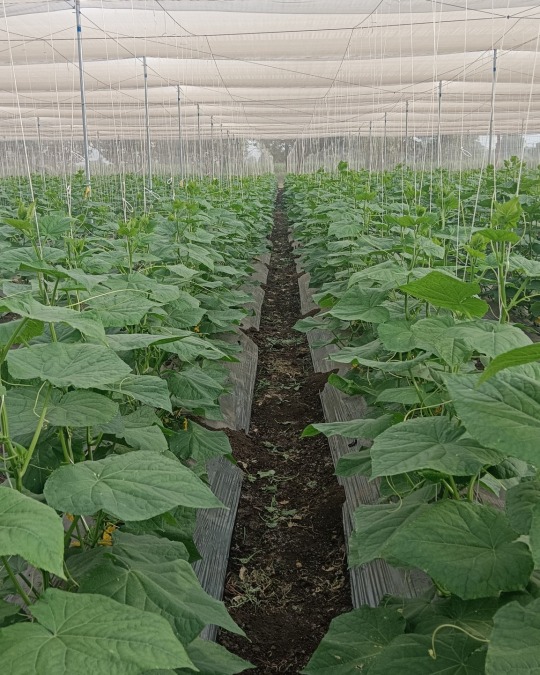
Cucumber Plantation in Low-Cost Wire Rope Nethouse at our site near Ahmedabad in Gujarat by Vatshal Green Environment.
Hi-tech protected cultivation and management by Vatshal Green Environment provides complete solutions for hi-tech greenhouse farming.
Vatshal Green provides sustainable farming solutions with protected farming structures setting up like Shade Nethouse, Low-Cost Wire Rope Shade Nethouse, Polyhouse, Tunnel House, etc. including Smart Irrigation Solutions, Farm Management, and Agronomy Services.
Contact us at: +91 78743 79887, +91 75677 79887
or visit: https://vatshalgreen.com/
#wireropenethouse#lowcostnethouse#cucumber#cucumberplantation#vatshal#vatshalgreen#vatshalgreenenvironemnt#protectedfarming#nethouse#polyhouse#greenhouse#nethousefarming#shadenethouse#hitechfarming#agriculture#agronomyservices#agroconsultancy#nethouseinstallation#farming#farmmanagement
0 notes
Text
Shakti Irrigation - Manufactures of drip irrigation systems, pipes & cables
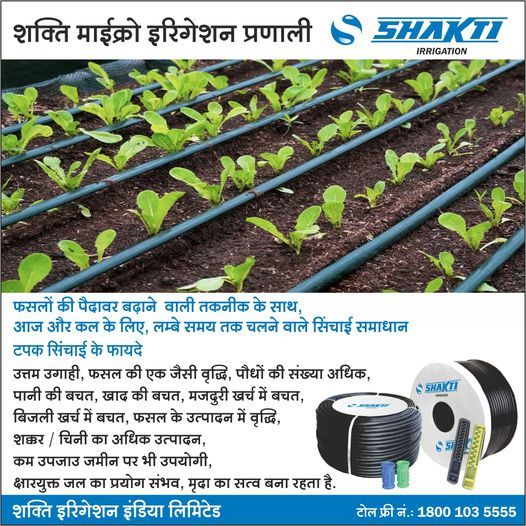
Shakti Irrigation today is a globally acclaimed company engaged in the manufacture of drip irrigation systems, pipes, cables, polyhouses etc. and provides complete solutions in the agriculture-irrigation arena as well as in the domestic, industry through the supply of pipes.
0 notes
Text
Top 10 Best Poly houses Manufacturers in India near Delhi
Sterling Arch is a trusted Poly houses Manufacturers and service provider that has been earning groundbreaking success with its construction services since it was established in 2005. Our highly qualified professionals manage our business interests by providing modern construction services with guaranteed quality, flexibility, technological advances, timely awareness, and cost efficiency. Our mission is to ensure complete customer satisfaction by offering high-quality services that set us apart from the competition. We strive to stay ahead of the curve when it comes to construction designs and layouts, and our team of experienced architects and R&D personnel work tirelessly to bring only the best solutions to the table.
Sterling Polyhouses are economically built and are being used for agricultural and horticultural activities all over India. These playhouses are also available for Indian farmers on a subsidy basis.
Feature:
Fine Finish
Effective sunlight radiation
Easy installation
Product Description
Product Type: Agricultural Single-Span Greenhouse
Price: 850 INR/ Square Foot
Minimum Order Quantity: 1000 Square Foot
Supply Ability: 1000 Square Foot Per Day
Greenhouse Size: Large
Cover Material: Film
Film Thickness: 10-50 millimeters (mm)
Frame Width: 10-20milimeter (mm)
Frame Material: Polycarbonate
Visit Us: Poly houses Manufacturers
Contact Information:
Surendra Bansal (Director)
01204250004, +91-9990444520
0 notes
Text
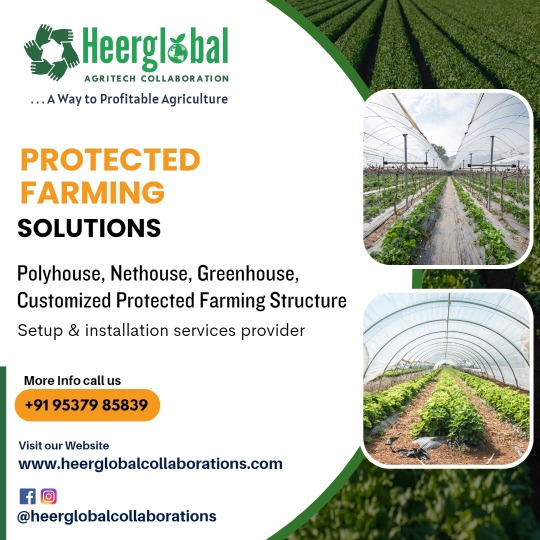
Protected Cultivation
We provide Sustainable protected farming solutions based on farmer’s requirements to increase their profit. Protected Cultivation structure installation like Nethouse, Polyhouse, Low-cost wire-rope structure with Filed management and sales & marketing support.
Heerglobal Agritech Collaborations Pvt Ltd is a various agriculture services provider, such as farmers training for natural organic farming, organic certification, farm produce marketing, FPO / FPC formation, agribusiness startup support, etc.
Contact us for more details on +91 95379 85839
#heerglobal#heerglobalcollaboration#HeerglobalAgritech#protectedfarming#protectedcultivation#nethouse#greenhouse#polyhouse#agriculture#hitechfarming#organicfarming#naturalfarming#farming#fpo#fpc#agristartup#agrostartup#agribusinesses#agroservices#gujarat
0 notes
Text
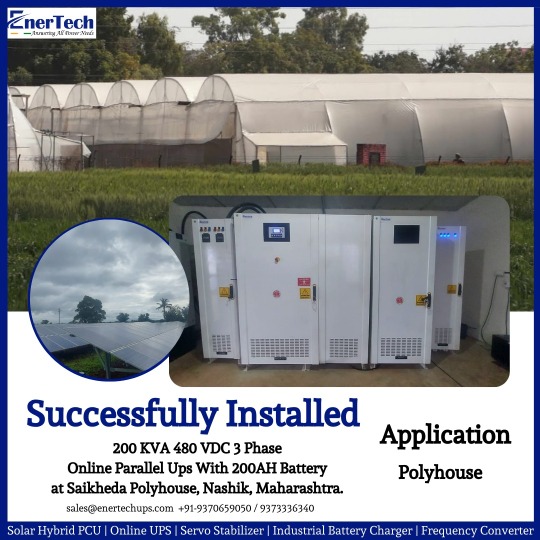
Enertech has installed a 200KVA 480VDC 3Ph Solar hybrid inverter used for a Polyhouse. Solar hybrid inverters are an excellent choice for Polyhouse. as they combine solar power with grid electricity, ensuring a reliable and sustainable source of energy.
The Enertech Solar hybrid inverter is a cutting-edge solution designed to power polyhouses efficiently and sustainably. Tailored specifically for agricultural applications, this advanced inverter seamlessly integrates solar energy with conventional power sources to provide a reliable and uninterrupted energy supply for polyhouse operations.
With its smart hybrid technology, the Enertech Solar hybrid inverter optimizes the use of solar power during daylight hours, harnessing the sun's energy to generate electricity. This solar energy not only powers the polyhouse's electrical systems but also charges the backup battery bank for use during non-sunlight hours or cloudy days.
The inverter's intelligent control system continuously monitors energy production and consumption, automatically switching between solar power, battery power, and grid power, depending on the prevailing conditions. This ensures a constant and stable power supply, reducing the reliance on costly grid electricity and minimizing energy expenses.
By leveraging renewable solar energy, polyhouse owners can significantly reduce their carbon footprint and contribute to a greener environment. Additionally, the Enertech Solar hybrid inverter's efficient energy management helps in optimizing resource utilization and contributes to overall cost savings for polyhouse operations.
Enertech Solar hybrid inverter offers a dependable and eco-friendly solution for powering polyhouses, enabling farmers to achieve greater energy independence, cost-efficiency, and environmental sustainability.
For more details please call us on
+91 9373336340
+91 9370659050
[email protected]
Saikheda #Polyhouse #Nashik #Maharashtra #Bongaigaon #assam #School #sikar #plant #Becharaji #gujrat #Car #Shed #Railway #Ranghat #West #Bengal #WB #Training #Khowai #Farmers #solarsysteminstallation #solarinstallers #reducebills #solarusecase #enertechups #enertech #hybridinverter #atmanirbhar
0 notes